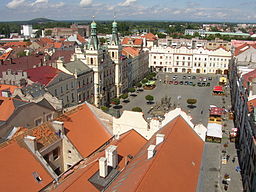Semtín
| Pardubice | |||
| City | |||
|
The main square as seen from the Green Tower
|
|||
|
|||
| Country | Czech Republic | ||
|---|---|---|---|
| Region | Pardubice | ||
| District | Pardubice | ||
| Rivers | Elbe, Chrudimka | ||
| Elevation | 237 m (778 ft) | ||
| Coordinates | 50°02′19″N 15°46′45″E / 50.03861°N 15.77917°ECoordinates: 50°02′19″N 15°46′45″E / 50.03861°N 15.77917°E | ||
| Area | 77.71 km2 (30.00 sq mi) | ||
| Population | 89,693 (2015) | ||
| Density | 1,154/km2 (2,989/sq mi) | ||
| First documented | 1295 | ||
| Mayor | Martin Charvát (21.11.2014) | ||
| Postal code | 530 01 | ||
| Website: Pardubice city | |||
Pardubice (Czech pronunciation: [ˈpardubɪtsɛ] (![]() listen); German: Pardubitz) is a city in the Czech Republic. It is the capital city of the Pardubice Region and lies on the river Elbe, 96 kilometres east of Prague. There is an old Tower and a Castle. Factories include the Synthesia chemical factory (manufacturer of Semtex, a plastic explosive), an oil refinery Paramo, a heavy machinery factory and an electronic equipment plant. The city is well known for its sport events (Great Pardubice Steeplechase, Golden Helmet of Pardubice, Czech Open), ginger bread, rail and air transport.
listen); German: Pardubitz) is a city in the Czech Republic. It is the capital city of the Pardubice Region and lies on the river Elbe, 96 kilometres east of Prague. There is an old Tower and a Castle. Factories include the Synthesia chemical factory (manufacturer of Semtex, a plastic explosive), an oil refinery Paramo, a heavy machinery factory and an electronic equipment plant. The city is well known for its sport events (Great Pardubice Steeplechase, Golden Helmet of Pardubice, Czech Open), ginger bread, rail and air transport.
The oldest extant document regarding Pardubice comes from 1295.
The area had a monastery founded in 2nd half of 13th century and the city was founded c. 1340. In 1491, Pardubice was bought by William II of Pernstein, who continued to expand the town and made significant impact on its prosperity. Until 1918, the town was part of the Austrian monarchy (Austria side after the compromise of 1867), head of the PARDUBITZ district, one of the 94 Bezirkshauptmannschaften in Bohemia.
...
Wikipedia





